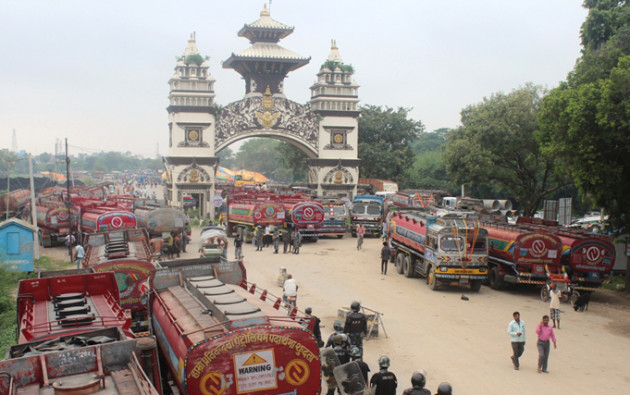Self-reliance is the only way out for a resilient Nepal (Commentary)
Manoj Karki, Kathmandu / November 7: Twenty six years after the first major economic blockade by neighbouring India, Nepal has been caught napping with no easy way out.
Though reasons and time period of the two blockades in 1989 and 2015 are different, Nepal’s suffering is due to the same reason i.e. dependence on India. The impact of the two blockades differ as the level of dependence was different. The dependence level in terms of trade on India in 1989 was around 40 per cent whereas it is almost 80 per cent at present.
The reason behind the Indian government resorting to an economic blockade over Nepal is however the same i.e. to exert its dominance over its tiny neighbour that it circles from three sides. However, India had better reasons to show to the world in 1989 to impose the economic blockade, which ultimately helped restore democracy in the landlocked country, thereby limiting then King Birendra, who did not want to dance to the tunes of his neighbour, to a constitutional monarch.
Today is the 21st century and hence very difficult to hide facts and figures from the glaring eyes of the world brought together through the mercurial advancement of information and technology. Hence, India takes the advantage of dissenting sentiment by a section of the Nepali people living just across its border to make it as an excuse to impose an economic blockade, just because Nepali leaders thought it was time to stand on their own feet.
As a landlocked country, Nepal has under international law right to the nearest port and hence an economic blockade by a giant India on Nepal is illegal by international standards. Foreign Minister Kamal Thapa, while defending Nepal’s position in the UPR before the UN Human Rights Council, also pointed out to the crisis that Nepal and the Nepalis are facing as a result of the blockade. This, he said, was just because Nepal had promulgated a constitution of its own. Cannot Nepal even draft its own constitution?, he questioned before the delegates of the members country taking part in the session on Nepal in Geneva recently.
On the occasion, the Foreign Minister also acknowledged that a section of the Nepali society living in the southern plans were unhappy with some parts of the new constitution, but stressed that it was an internal matter, and that Nepal was competent enough to address it on its own. In a way, the matter has been internationalized, with the issue being raised at an international forum. Furthermore, the issue has also been raised by the European Union in Nepal and the US Embassy, that have alerted over the possibility of a serious humanitarian crisis if the situation persisted any longer.
However, it has not had any impact on the deaf ears of India, and there has been no signs as of yet that the largest democracy in the world would allow a sovereign country run its affairs democratically. It continues to deny that an economic blockade has been imposed, while pointing out to Nepal to resolve its internal problems first. The helping hand from neighbouring China has added salt to injury as far as the Indian establishment is concerned.
Hence, it is hard to tell what would eventually bring this standoff to an end and avert any serious humanitarian crisis in Nepal, already reeling from the devastating April 25 earthquake. Statistics reveal that the impact of the economic blockade has already surpassed the damage caused by the earthquake six months ago. It is thereby a double blow for a country looking desperately to move ahead towards the path to economic prosperity after finally completely the long and arduous journey of constitution-making.
But no matter what it leads to, Nepal must not repeat the mistake post 1989 blockade, and hence strive to become self-reliant. This is not possible overnight, but the leaders who have now become brave enough to stand shoulder to shoulder to the Indian establishment, must design a long-term strategy and set goals towards self-sufficiency. Diversification of trade, which is now only concentrated towards India, must be the starting point. And harnessing of the immense hydropower potentials, the long-term goal of leading Nepal towards become a self-reliant nation. In between, stress should be laid in the agriculture sector to make sure that we produce at least as much as we need as far as our staple food of rice and grains are concerned.
Only then, we will be able build back better, a stronger and resilient Nepal, a country that its neighbours would not bully but respect as a fellow member of the international community. RSS

